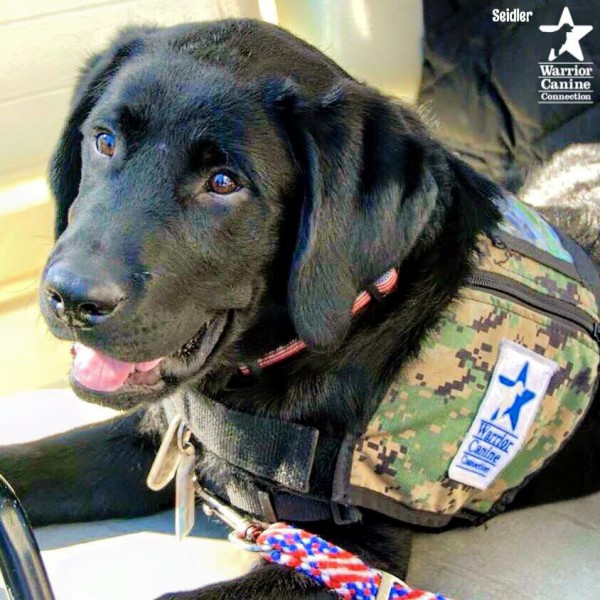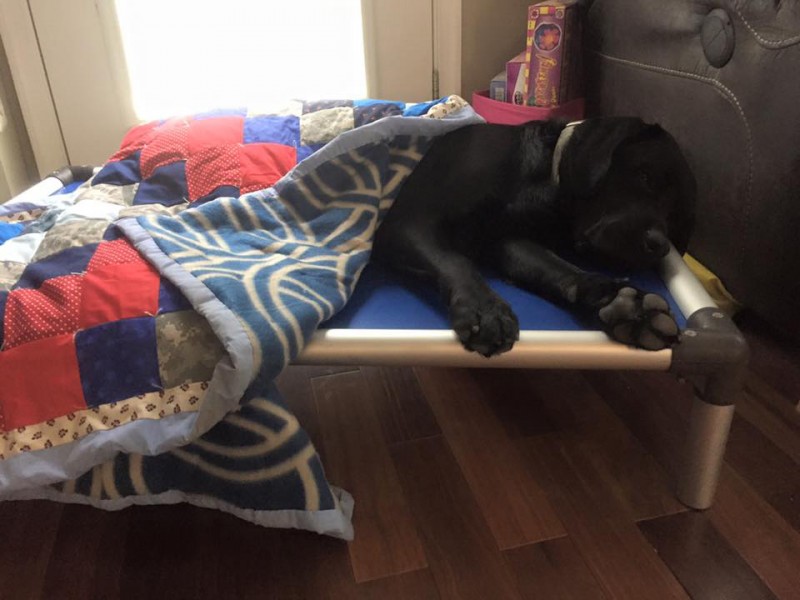Preparing to Serve: WCC’s Service Dog Training Program
Posted by Jenn on 01/18/2016
At Kuranda, we’re huge fans of Warrior Canine Connection, a Maryland-based military service dog organization. (Their dogs are big fans of our beds, too!) We spoke to the manager of their puppy training program to find out how they breed and train these amazing dogs.
Breeding Exceptional Service Dogs
To provide wounded warriors with the healthiest possible service dogs, Warrior Canine Connection carefully breeds Labrador and golden retrievers for health, strength, and temperament. These puppies are smart, friendly, and just plain adorable. They even have their own fan base! Extreme Puppy Watchers, or EPWs, follow the puppies via the online Puppy Cam. (Fair warning: The Puppy Cam is addictive. “We’ve been banned from many a workplace, I hear,” jokes Cheryl Bingham, who manages the puppy training program.) WCC puppies are named in honor of service members and veterans. You can even nominate someone to become a WCC puppy namesake.
At 8-12 weeks, the puppies go home with their puppy parents, who volunteer to raise the puppies for the first two years of their lives. WCC provides all supplies, veterinary care, and, of course, extensive training for each puppy.
Training Service Dogs
Puppy parents are usually military or civilian employees at one of WCC’s locations. During the day while the parents are at work, the puppies participate in WCC’s on-base training program.
WCC dogs are trained to do amazing things, from picking up items on the floor and opening the fridge to pulling someone in a manual wheelchair. They can also brace warriors prone to unsteadiness or dizziness.
One thing WCC dogs are not taught to do is “guard” the veteran. For example, some programs teach dogs to accommodate PTSD by entering buildings ahead of the warrior and turning on the lights. Instead, WCC encourages the warriors and the dogs to engage with the world together. “We do not support symptoms,” Cheryl says. “We don’t want people being scared of the veteran, and we don’t want people being scared of the dog.”
Veterans on the base help socialize the puppies by taking them on outings and exposing them to a variety of settings and situations. To keep the dog focused, the trainers have to use happy voices and project calm themselves—even when encountering potential PTSD triggers, such as sudden loud noises. Together, the veteran and the dog learn that the world is safe.
This approach, called mission-based trauma recovery, is especially effective because it gives veterans a sense of purpose. They know that disabled veterans will one day depend on the dog they are helping to train. “A lot of times they don’t want to do something for themselves, but they will do it for their fellow military brothers and sisters,” Cheryl says. “They know service.”
Going to Work
WCC trainers watch the puppies very carefully to determine their individual talents and interests. Each dog must ultimately choose its career, or else choose to be “released” from service to become a beloved pet. As Cheryl says, you can’t make a dog do anything it doesn’t want to do. These dogs are extremely disciplined and love to please their people, and Cheryl is happy to give them all the credit. “I’d like to say we’re wonderful trainers, but they’re just amazing dogs,” she says. “They make us look good.”
Around the age of two, dogs who have chosen to become mobility service dogs are matched with veterans who need their particular skills. Veterans in need of a service dog will usually meet with several candidates, but Cheryl says the decision is not difficult. When the chemistry is right, the veteran and the dog will just click. Many veterans have already waited two years for their dogs, so WCC does not hold up matches for the graduation celebration. (WCC is planning to breed many more dogs in 2016 to help reduce the long waiting list.)
For puppy parents, saying goodbye at the end of the two years can be bittersweet, but the experience is so rewarding that many volunteer to do it again. As for the puppies, they are not sad to move on. “They seem to know they have a job,” Cheryl says.
Learn more about how you can help Kuranda support Warrior Canine Connection!


